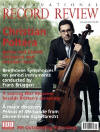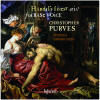Texte paru dans: / Appeared in:
*

International Record Review - (01/2013)
Pour
s'abonner / Subscription information
Hyperion
CDA67842

Code-barres / Barcode : 0034571178424 (ID269)
Consultez toutes les évaluations recensées pour ce cd
~~~~ Reach all the evaluations located for this CD
Yes, this CD’s title announces ‘finest arias for Base Voice’: it is not a typographical error on our part. This is a recital of arias: no harpsichord solos or concerti grossi to challenge trades description. Operatic arias supply about one third of the content, with oratorios and serenatas the rest. Some of the excerpts are quite frequently heard, or relatively so, but have those from Belshazzar, Muzio Scevola and Riccardo Primo been recorded often outside complete recordings? The programme is a colourful landscape, fulfilling David Vickers’s assertion in his note that ‘this recital is designed to explore how Handel’s bass arias for different sorts of dramatic and literary contexts are superb musically, contrasting stylistically and insightful emotionally’. Thus rant-and-rage arias take a place alongside quieter numbers like the exquisitely touching and slow ‘Tears, such as tender fathers shed’. Whatever the mood or the message, these pieces are well presented by Christopher Purves and Jonathan Cohen’s Arcangelo, a splendid group which has delighted me on other CDs.
Indeed, the full strings of Arcangelo are truly lively in Handel’s music, and admirable playing is heard from wind soloists, as from the trumpeters in the exciting first aria, ‘Sibilar gli angui d’Aletto’, or the bassoon that joins a violin in the obbligato in ‘Mie piante correte’, but Rebecca Miles’s deftness on the recorder in ‘O ruddier than the cherry’ is to be appreciated: her little figuration in the last few notes made me chuckle.
Purves is generally in robust and rounded voice, with just a touch of greyness imposing itself in places. He uses a range of dynamics, modulations and the like: one is very much aware of his attention to the words in Polyphemus’s recitative ‘I rage, I melt, I burn’ on the second track. It lays down what is virtually an artistic template which tells the listener that this recital is not going to be limited to one colour or one volume, and so it transpires. Listen to the suggestion of horror or fear that he injects into the middle part of ‘Revenge, Timotheus cries’ as he sings of the ‘ghastly band’ of Grecian ghosts: possibly the most graphic portrayal of the five lines involved that I have heard.
Many of these selections resemble a roller coaster of notes as the musical line rises and falls, or plunges in the very challenging and awkward leaps in ‘Fra l’ombre e gl’orrori’ from the early (1708) Aci, Galatea e Polifemo taking the singer over a range of two and a half octaves. Did Handel write lower notes for the voice anywhere? A couple do test Purves, but he produces an overall coverage that I do not remember having been bettered. The higher stretches of his voice are free. The remaining bravura arias in the recital flow more easily in their structure, and Purves sails through them confidently and cleanly, shunning the use of aspirate notes. One notable example of his ability in that particular field is Isacio’s fiery aria ‘Nel mondo e nell’abisso in Riccardo Primo. In a few arias there are small signs of pushing the tone: barely significant.
Less ornate is the jaunty ‘Mirth, admit me of thy crew’, springily sung and played, with the horn prominent in the obbligato . The gentleness of the Deborah aria, eloquently phrased and voiced by Purves, finds a match in its omission of bravura virtuosity in Somnus’s desire for sleep as he implores the loathsome light to go away. It concludes this programme full of contrasts, to which Purves reacts in the spirit of each piece, be the character in question a magician who uses his powers for good (Zoroastre in Orlando), with a flowing tone, or a tyrant such as Valens in the oratorio Theodora, threatening all who oppose him: ‘Racks, gibbets, sword and fire’. Purves emits such vocal venom that there is no mistaking Valens’s determination (does he relish the words a bit too strongly?). One must not forget Porsena’s cry to the winds in Handel’s contribution to Muzio Scevola or the lovely little aria ‘Vieni, o cara’ (Purves producing softness of tone) from Aggripina, the shortest aria on the disc.
The sound is kind to both the voice and
the orchestra, the latter directed in lively manner by its founder. Cohen
proves again that he and Arcangelo are convincing and winning exponents of
Baroque music. Almost 40 players are named as participants in this
recording, combining with the singer for a very worthwhile CD.
Fermer la fenêtre/Close window
Cliquez l'un ou l'autre
bouton pour découvrir bien d'autres critiques de CD
Click either button for many other reviews


